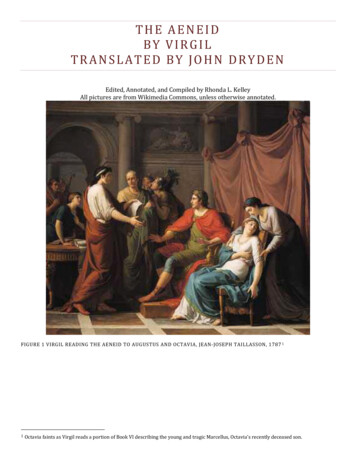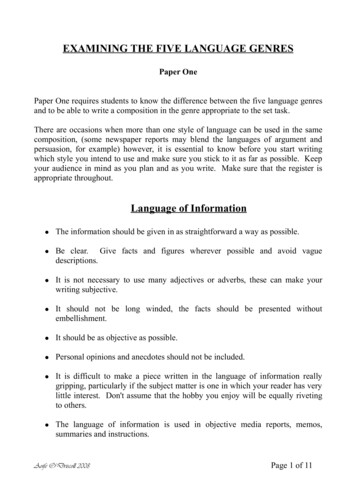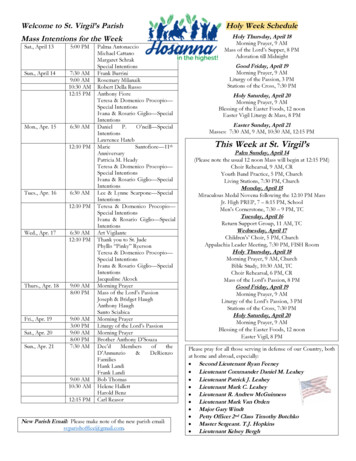
Transcription
Virgil : The Aeneid
Translated by A. S. Kline2002 All Rights ReservedThis work MAY be FREELY reproduced, stored andtransmitted, electronically or otherwise, for any NONCOMMERCIAL purpose.This and other texts available atwww.poetryintranslation.comContact: tonykline@yahoo.com2
ContentsBkI:1-11 Invocation to the Muse. 9BkI:12-49 The Anger of Juno . 9BkI:50-80 Juno Asks Aeolus for Help . 10BkI:81-123 Aeolus Raises the Storm. 11BkI:124-156 Neptune Intervenes. 12BkI:157-222 Shelter on the Libyan Coast . 13BkI:223-256 Venus Intercedes with Jupiter . 15BkI:257-296 Jupiter’s Prophecy . 16BkI:297-371 Venus Speaks to Aeneas . 18BkI:372-417 She Directs Him to Dido’s Palace . 20BkI:418-463 The Temple of Juno. 21BkI:464-493 The Frieze .23BkI:494-519 The Arrival of Queen Dido . 24BkI:520-560 Ilioneus Asks Her Assistance .25BkI:561-585 Dido Welcomes the Trojans . 26BkI:586-612 Aeneas Makes Himself Known .27BkI:613-656 Dido Receives Aeneas.27BkI:657-694 Cupid Impersonates Ascanius . 29BkI:695-722 Cupid Deceives Dido .30BkI:723-756 Dido Asks for Aeneas’s Story. 31BkII:1-56 The Trojan Horse: Laocoön’s Warning.33BkII:57-144 Sinon’s Tale.34BkII:145-194 Sinon Deludes the Trojans .37BkII:195-227 Laocoön and the Serpents.38BkII:228-253 The Horse Enters Troy. 39BkII:254-297 The Greeks Take the City. 40BkII:298-354 Aeneas Gathers his Comrades . 42BkII:355-401 Aeneas and his Friends Resist .43BkII:402-437 Cassandra is Taken . 45BkII:438-485 The Battle for the Palace. 46BkII:486-558 Priam’s Fate . 473
BkII:559-587 Aeneas Sees Helen . 49BkII:588-623 Aeneas is Visited by his Mother Venus. 50BkII:624-670 Aeneas Finds his Family . 51BkII:671-704 The Omen.53BkII:705-729 Aeneas and his Family Leave Troy . 54BkII:730-795 The Loss of Creusa.55BkII:796-804 Aeneas Leaves Troy.57BkIII:1-18 Aeneas Sails to Thrace. 58BkIII:19-68 The Grave of Polydorus. 58BkIII:69-120 The Trojans Reach Delos . 60BkIII:121-171 The Plague and a Vision. 61BkIII:172-208 The Trojans Leave Crete for Italy.63BkIII:209-277 The Harpies . 64BkIII:278-293 The Games at Actium. 66BkIII:294-355 Andromache in Chaonia . 67BkIII:356-462 The Prophecy of Helenus . 68BkIII:463-505 The Departure from Chaonia .72BkIII:506-547 In Sight of Italy .73BkIII:548-587 The Approach to Sicily. 74BkIII:588-654 Achaemenides .75BkIII:655-691 Polyphemus.77BkIII:692-718 The Death of Anchises . 78BkIV:1-53 Dido and Anna Discuss Aeneas. 80BkIV:54-89 Dido in Love . 81BkIV:90-128 Juno and Venus. 82BkIV:129-172 The Hunt and the Cave .83BkIV:173-197 Rumour Reaches Iarbas . 85BkIV:198-218 Iarbas Prays to Jupiter . 86BkIV:219-278 Jupiter Sends Mercury to Aeneas. 86BkIV:279-330 Dido Accuses Aeneas. 88BkIV:331-361 Aeneas Justifies Himself . 90BkIV:362-392 Dido’s Reply . 91BkIV:393-449 Aeneas Departs. 92BkIV:450-503 Dido Resolves to Die . 93BkIV:504-553 Dido Laments. 954
BkIV:554-583 Mercury Visits Aeneas Again . 96BkIV:584-629 Dido’s Curse . 97BkIV:630-705 The Death of Dido. 99BkV:1-41 Aeneas Returns to Sicily . 102BkV:42-103 Aeneas Declares the Games. 103BkV:104-150 The Start of the Games. 105BkV:151-243 The Boat Race . 106BkV:244-285 The Prize-Giving for the Boat Race . 109BkV:286-361 The Foot Race.110BkV:362-484 The Boxing Contest . 112BkV:485-544 The Archery Contest .116BkV:545-603 The Exhibition of Horsemanship .118BkV:604-663 Juno sends Iris to Fire the Trojan Ships. 120BkV:664-699 The Fleet is Saved . 121BkV:700-745 Nautes’ Advice and Anchises’ Ghost . 122BkV:746-778 Departure from Sicily. 124BkV:779-834 Venus Seeks Neptune’s Help . 125BkV:835-871 The Loss of Palinurus . 127BkVI:1-55 The Temple at Cumae. 129BkVI:56-97 The Sibyl’s Prophecy . 130BkVI:98-155 Aeneas Asks Entry to Hades. 132BkVI:156-182 The Finding of Misenus’s Body.133BkVI:183-235 The Funeral Pyre . 134BkVI:236-263 The Sacrifice to Hecate . 136BkVI:264-294 The Entrance to Hades . 137BkVI:295-336 The Shores of Acheron. 138BkVI:337-383 The Shade of Palinurus. 139BkVI:384-416 Charon the Ferryman . 140BkVI:417-439 Beyond the Acheron .141BkVI:440-476 The Shade of Dido . 142BkVI:477-534 The Shade of Deiphobus . 143BkVI:535-627 The Sibyl Describes Tartarus . 145BkVI:628-678 The Fields of Elysium. 148BkVI:679-702 The Meeting with Anchises. 149BkVI:703-723 The Souls Due for Re-birth . 1505
BkVI:724-751 The Transmigration of Souls . 151BkVI:752-776 The Future Race – The Alban Kings. 152BkVI:777-807 The Future Race – Romulus and the Caesars . 152BkVI:808-853 The Future Race – Republic and Beyond .153BkVI:854-885 The Future Race – Marcellus. 155BkVI:886-901 The Gates of Sleep . 156BkVII:1-36 The Trojans Reach the Tiber. 157BkVII:37-106 King Latinus and the Oracle . 158BkVII:107-147 Fulfilment of A Prophecy. 160BkVII:148-191 The Palace of Latinus.161BkVII:192-248 The Trojans Seek Alliance With Latinus . 162BkVII:249-285 Latinus Offers Peace . 164BkVII:286-341 Juno Summons Allecto. 165BkVII:341-405 Allecto Maddens Queen Amata. 167BkVII:406-474 Allecto Rouses Turnus . 169BkVII:475-539 Allecto Among the Trojans. 171BkVII:540-571 Allecto Returns to Hades . 173BkVII:572-600 Latinus Abdicates . 174BkVII:601-640 Latium Prepares for War . 175BkVII:641-782 The Battle-List . 176BkVII:783-817 Turnus and Camilla Complete the Array . 180BkVIII:1-25 The Situation in Latium . 182BkVIII:26-65 Aeneas’s Dream of Tiberinus. 182BkVIII:66-101 Aeneas Sails to Pallanteum . 184BkVIII:102-151 Aeneas Meets Evander. 185BkVIII:152-183 Evander Offers Alliance . 186BkVIII:184-305 The Tale of Hercules and Cacus. 187BkVIII:306-369 Pallanteum – the Site of Rome .191BkVIII:370-406 Venus Seeks Weapons from Vulcan. 193BkVIII:407-453 Vulcan’s Smithy . 194BkVIII:454-519 Evander Proposes Assistance . 195BkVIII:520-584 The Preliminary Alarms . 198BkVIII:585-625 Venus’s Gift of Armour.199BkVIII:626-670 Vulcan’s Shield: Scenes of Early Rome . 201BkVIII:671-713 Vulcan’s Shield: The Battle of Actium . 2026
BkVIII:714-731 Vulcan’s Shield: Augustus’s Triple Triumph .203BkIX:1-24 Iris Urges Turnus to War.205BkIX:25-76 Turnus Attacks the Trojan Fleet .205BkIX:77-106 Cybele Makes a Plea to Jove . 207BkIX:107-122 Cybele Transforms the Ships . 208BkIX:123-167 Turnus Lays Siege to the Camp. 208BkIX:168-223 Nisus and Euryalus: A Mission Proposed . 210BkIX:224-313 Nisus and Euryalus: Aletes Consents . 211BkIX:314-366 Nisus and Euryalus: The Raid. 214BkIX:367-459 The Death of Euryalus and Nisus. 216BkIX:460-524 Euryalus’s Mother Laments. 218BkIX:525-589 Turnus in Battle. 220BkIX:590-637 Ascanius (Iulus) in Battle.222BkIX:638-671 Apollo Speaks to Iulus .224BkIX:672-716 Turnus at the Trojan Gates .225BkIX:717-755 The Death of Pandarus. 226BkIX:756-787 Turnus Slaughters the Trojans .227BkIX:788-818 Turnus Is Driven Off . 228BkX:1-95 The Council of the Gods .230BkX:96-117 Jupiter Leaves the Outcome to Fate .232BkX:118-162 Aeneas Returns From Pallantium. 233BkX:163-214 The Leaders of the Tuscan Fleet .234BkX:215-259 The Nymphs of Cybele .236BkX:260-307 Aeneas Reaches Land .237BkX:308-425 The Pitched Battle .239BkX:426-509 The Death of Pallas .242BkX:510-605 Aeneas Rages In Battle.245BkX:606-688 Juno Withdraws Turnus from the Fight. 248BkX:689-754 Mezentius Rages in Battle.250BkX:755-832 The Death of Mezentius’s Son, Lausus.252BkX:833-908 The Death of Mezentius.254BkXI:1-99 Aeneas Mourns Pallas .258BkXI:100-138 Aeneas Offers Peace . 260BkXI:139-181 Evander Mourns Pallas. 262BkXI:182-224 The Funeral Pyres .2637
BkXI:225-295 An Answer From Arpi . 264BkXI:296-335 Latinus’s Proposal. 266BkXI:336-375 Drances Attacks Turnus Verbally . 268BkXI:376-444 Turnus Replies. 269BkXI:445-531 The Trojans Attack. 271BkXI:532-596 Diana’s Concern For Camilla .273BkXI:597-647 The Armies Engage .275BkXI:648-724 Camilla In Action .277BkXI:725-767 Arruns Follows Her . 279BkXI:768-835 The Death of Camilla . 281BkXI:836-915 Opis Takes Revenge.283BkXII:1-53 Turnus Demands Marriage . 286BkXII:54-80 He Proposes Single Combat. 287BkXII:81-112 He Prepares For Battle. 288BkXII:113-160 Juno Speaks to Juturna. 289BkXII:161-215 Aeneas and Latinus Sacrifice . 290BkXII:216-265 The Rutulians Break The Treaty . 292BkXII:266-310 Renewed Fighting. 294BkXII:311-382 Aeneas Wounded: Turnus Rampant . 295BkXII:383-467 Venus Heals Aeneas. 297BkXII:468-499 Juturna Foils Aeneas . 300BkXII:500-553 Aeneas And Turnus Amongst The Slaughter . 301BkXII:554-592 Aeneas Attacks The City.302BkXII:593-613 Queen Amata’s Suicide. 304BkXII:614-696 Turnus Hears Of Amata’s Death. 304BkXII:697-765 The Final Duel Begins.307BkXII:766-790 The Goddesses Intervene . 309BkXII:791-842 Jupiter And Juno Decide The Future. 310BkXII:843-886 Jupiter Sends Juturna A Sign. 311BkXII:887-952 The Death Of Turnus .3138
BkI:1-11 Invocation to the MuseI sing of arms and the man, he who, exiled by fate,first came from the coast of Troy to Italy, and toLavinian shores – hurled about endlessly by land and sea,by the will of the gods, by cruel Juno’s remorseless anger,long suffering also in war, until he founded a cityand brought his gods to Latium: from that the Latin peoplecame, the lords of Alba Longa, the walls of noble Rome.Muse, tell me the cause: how was she offended in her divinity,how was she grieved, the Queen of Heaven, to drive a man,noted for virtue, to endure such dangers, to face so manytrials? Can there be such anger in the minds of the gods?BkI:12-49 The Anger of JunoThere was an ancient city, Carthage (held by colonists from Tyre),opposite Italy, and the far-off mouths of the Tiber,rich in wealth, and very savage in pursuit of war.They say Juno loved this one land above all others,even neglecting Samos: here were her weaponsand her chariot, even then the goddess worked at,and cherished, the idea that it should have supremacyover the nations, if only the fates allowed.Yet she’d heard of offspring, derived from Trojan blood,that would one day overthrow the Tyrian stronghold:that from them a people would come, wide-ruling,and proud in war, to Libya’s ruin: so the Fates ordained.Fearing this, and remembering the ancient warshe had fought before, at Troy, for her dear Argos,(and the cause of her anger and bitter sorrowshad not yet passed from her mind: the distant judgementof Paris stayed deep in her heart, the injury to her scorned beauty,her hatred of the race, and abducted Ganymede’s honours)9
the daughter of Saturn, incited further by this,hurled the Trojans, the Greeks and pitiless Achilles had left,round the whole ocean, keeping them far from Latium:they wandered for many years, driven by fate over all the seas.Such an effort it was to found the Roman people.They were hardly out of sight of Sicily’s isle, in deeper water,joyfully spreading sail, bronze keel ploughing the brine,when Juno, nursing the eternal wound in her breast,spoke to herself: ‘Am I to abandon my purpose, conquered,unable to turn the Teucrian king away from Italy!Why, the fates forbid it. Wasn’t Pallas able to burnthe Argive fleet, to sink it in the sea, because of the guiltand madness of one single man, Ajax, son of Oileus?She herself hurled Jupiter’s swift fire from the clouds,scattered the ships, and made the sea boil with storms:She caught him up in a water-spout, as he breathed flamefrom his pierced chest, and pinned him to a sharp rock:yet I, who walk about as queen of the gods, wifeand sister of Jove, wage war on a whole race, for so many years.Indeed, will anyone worship Juno’s power from now on,or place offerings, humbly, on her altars?’BkI:50-80 Juno Asks Aeolus for HelpSo debating with herself, her heart inflamed, the goddesscame to Aeolia, to the country of storms, the placeof wild gales. Here in his vast cave, King Aeolus,keeps the writhing winds, and the roaring tempests,under control, curbs them with chains and imprisonment.They moan angrily at the doors, with a mountain’s vast murmurs:Aeolus sits, holding his sceptre, in his high stronghold,softening their passions, tempering their rage: if not,they’d surely carry off seas and lands and the highest heavens,with them, in rapid flight, and sweep them through the air.But the all-powerful Father, fearing this, hid them10
in dark caves, and piled a high mountain mass over themand gave them a king, who by fixed agreement, would knowhow to give the order to tighten or slacken the reins.Juno now offered these words to him, humbly:‘Aeolus, since the Father of gods, and king of men,gave you the power to quell, and raise, the waves with the winds,there is a people I hate sailing the Tyrrhenian Sea,bringing Troy’s conquered gods to Italy:Add power to the winds, and sink their wrecked boats,or drive them apart, and scatter their bodies over the sea.I have fourteen Nymphs of outstanding beauty:of whom I’ll name Deiopea, the loveliest in looks,joined in eternal marriage, and yours for ever, so that,for such service to me as yours, she’ll spend all her yearswith you, and make you the father of lovely children.’Aeolus replied: ‘Your task, O queen, is to decidewhat you wish: my duty is to fulfil your orders.You brought about all this kingdom of mine, the sceptre,Jove’s favour, you gave me a seat at the feasts of the gods,and you made me lord of the storms and the tempests.’BkI:81-123 Aeolus Raises the StormWhen he had spoken, he reversed his trident and struckthe hollow mountain on the side: and the winds, formed ranks,rushed out by the door he’d made, and whirled across the earth.They settle on the sea, East and West wind,and the wind from Africa, together, thick with storms,stir it all from its furthest deeps, and roll vast waves to shore:follows a cry of men and a creaking of cables.Suddenly clouds take sky and day awayfrom the Trojan’s eyes: dark night rests on the sea.It thunders from the pole, and the aether flashes thick fire,and all things threaten immediate death to men.Instantly Aeneas groans, his limbs slack with cold:11
stretching his two hands towards the heavens,he cries out in this voice: ‘Oh, three, four times fortunatewere those who chanced to die in front of their father’s eyesunder Troy’s high walls! O Diomede, son of Tydeusbravest of Greeks! Why could I not have fallen, at your hand,in the fields of Ilium, and poured out my spirit,where fierce Hector lies, beneath Achilles’s spear,and mighty Sarpedon: where Simois rolls, and sweeps awayso many shields, helmets, brave bodies, of men, in its waves!’Hurling these words out, a howling blast from the north,strikes square on the sail, and lifts the seas to heaven:the oars break: then the prow swings round and offersthe beam to the waves: a steep mountain of water follows in a mass.Some ships hang on the breaker’s crest: to others the yawning deepshows land between the waves: the surge rages with sand.The south wind catches three, and whirls them onto hidden rocks(rocks the Italians call the Altars, in mid-ocean,a vast reef on the surface of the sea) three the east wind drivesfrom the deep, to the shallows and quick-sands (a pitiful sight),dashes them against the bottom, covers them with a gravel mound.A huge wave, toppling, strikes one astern, in front of his very eyes,one carrying faithful Orontes and the Lycians.The steersman’s thrown out and hurled headlong, face down:but the sea turns the ship three times, driving her round,in place, and the swift vortex swallows her in the deep.Swimmers appear here and there in the vast waste,men’s weapons, planking, Trojan treasure in the waves.Now the storm conquers Iloneus’s tough ship, now Achates,now that in which Abas sailed, and old Aletes’s:their timbers sprung in their sides, all the shipslet in the hostile tide, and split open at the seams.BkI:124-156 Neptune IntervenesNeptune, meanwhile, greatly troubled, saw that the sea12
was churned with vast murmur, and the storm was looseand the still waters welled from their deepest levels:he raised his calm face from the waves, gazing over the deep.He sees Aeneas’s fleet scattered all over the ocean,the Trojans crushed by the breakers, and the plummeting sky.And Juno’s anger, and her stratagems, do not escape her brother.He calls the East and West winds to him, and then says:‘Does confidence in your birth fill you so? Winds, do you dare,without my intent, to mix earth with sky, and cause such trouble,now? You whom I – ! But it’s better to calm the running waves:you’ll answer to me later for this misfortune, with a differentpunishment. Hurry, fly now, and say this to your king:control of the ocean, and the fierce trident, were given to me,by lot, and not to him. He owns the wild rocks, home to you,and yours, East Wind: let Aeolus officiate in his palace,and be king in the closed prison of the winds.’So he speaks, and swifter than his speech, he calms the swollen sea,scatters the gathered cloud, and brings back the sun.Cymothoë and Triton, working together, thrust the shipsfrom the sharp reef: Neptune himself raises them with his trident,parts the vast quicksand, tempers the flood,and glides on weightless wheels, over the tops of the waves.As often, when rebellion breaks out in a great nation,and the common rabble rage with passion, and soon stonesand fiery torches fly (frenzy supplying weapons),if they then see a man of great virtue, and weighty service,they are silent, and stand there listening attentively:he sways their passions with his words and soothes their hearts:so all the uproar of the ocean died, as soon as their father,gazing over the water, carried through the clear sky, wheeledhis horses, and gave them their head, flying behind in his chariot.BkI:157-222 Shelter on the Libyan CoastThe weary followers of Aeneas made efforts to set a course13
for the nearest land, and tacked towards the Libyan coast.There is a place there in a deep inlet: an island forms a harbourwith the barrier of its bulk, on which every wave from the deepbreaks, and divides into diminishing ripples.On this side and that, vast cliffs and twin crags loom in the sky,under whose summits the whole sea is calm, far and wide:then, above that, is a scene of glittering woods,and a dark grove overhangs the water, with leafy shade:under the headland opposite is a cave, curtained with rock,inside it, fresh water, and seats of natural stone,the home of Nymphs. No hawsers moor the weary shipshere, no anchor, with its hooked flukes, fastens them.Aeneas takes shelter here with seven ships gatheredfrom the fleet, and the Trojans, with a passion for dry land,disembarking, take possession of the sands they longed for,and stretch their brine-caked bodies on the shore.At once Achates strikes a spark from his flint,catches the fire in the leaves, places dry fuel round it,and quickly has flames among the kindling.Then, wearied by events, they take out wheat, damagedby the sea, and implements of Ceres, and prepare to parchthe grain over the flames, and grind it on stone.Aeneas climbs a crag meanwhile, and searches the whole prospectfar and wide over the sea, looking if he can see anythingof Antheus and his storm-tossed Phrygian galleys,or Capys, or Caicus’s arms blazoned on a high stern.There’s no ship in sight: he sees three stags wanderingon the shore: whole herds of deer follow at their back,and graze in long lines along the valley.He halts at this, and grasps in his hand his bowand swift arrows, shafts that loyal Achates carries,and first he shoots the leaders themselves, their heads,with branching antlers, held high, then the mass, with his shafts,and drives the whole crowd in confusion among the leaves:The conqueror does not stop until he’s scattered seven huge14
carcasses on the ground, equal in number to his ships.Then he seeks the harbour, and divides them among all his friends.Next he shares out the wine that the good Acestes had stowedin jars, on the Trinacrian coast, and that hero had given themon leaving: and speaking to them, calmed their sad hearts:‘O friends (well, we were not unknown to trouble before)O you who’ve endured worse, the god will grant an end to this too.You’ve faced rabid Scylla, and her deep-sounding cliffs:and you’ve experienced the Cyclopes’s rocks:remember your courage and chase away gloomy fears:perhaps one day you’ll even delight in remembering this.Through all these misfortunes, these dangerous times,we head for Latium, where the fates hold peaceful livesfor us: there Troy’s kingdom can rise again. Endure,and preserve yourselves for happier days.’So his voice utters, and sick with the weight of care, he pretendshope, in his look, and stifles the pain deep in his heart.They make ready the game, and the future feast:they flay the hides from the ribs and lay the flesh bare:some cut it in pieces, quivering, and fix it on spits,others place cauldrons on the beach, and feed them with
and brought his gods to Latium: from that the Latin people came, the lords of Alba Longa, the walls of noble Rome. Muse, tell me the cause: how was she offended in her divinity, how was she







